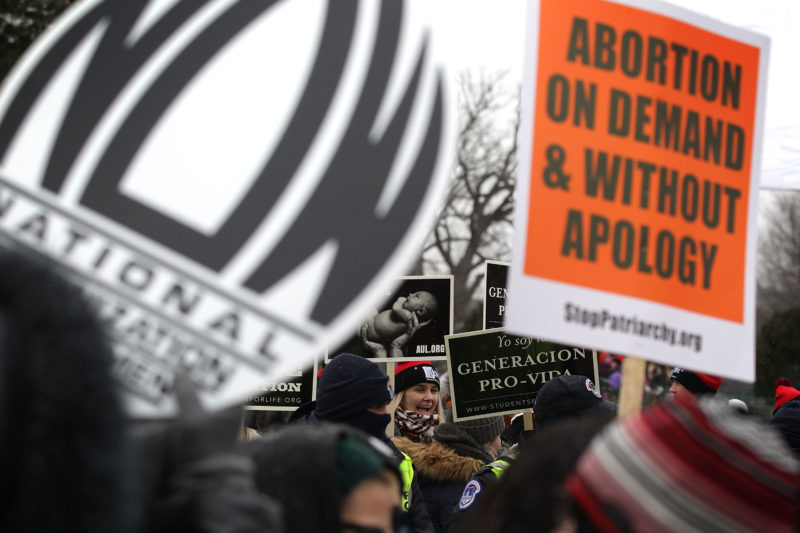New York Democrats Are Finally in Position to Cement Abortion Rights (Updated)
With Brett Kavanaugh on the U.S. Supreme Court, New York's new Democratic state senate majority is ready to take action to protect abortion rights.

UPDATE, January 23, 8:01 a.m.: The Reproductive Health Act on Tuesday was signed into law by Gov. Andrew Cuomo (D) after passing both chambers of the Democratic-majority New York legislature.
For the first time in decades, Democrats have control of the New York State Senate, and one of their first priorities for 2019 will be passing the long-thwarted Reproductive Health Act.
With progressive candidates wiping out Republicans and conservative Democrats in the midterms, abortion rights advocates are hopeful that 2019 will be the year New York passes both the Reproductive Health Act (RHA) and the Comprehensive Contraception Coverage Act (CCCA).
“We see this a real opportunity to make New York the progressive state it is meant to be and should be, especially with what’s happening at the federal level, especially at the Supreme Court, to really damage or overthrow Roe v. Wade,” said Robin Chappelle Golston, president of Planned Parenthood Empire State Acts, which has worked with the RHA’s sponsors to support the legislation. “We think there is a lot of momentum behind it, and we really do want to get it done as quickly as possible to make sure all New Yorkers have access to those rights.”
Blocked for years by the GOP leadership in Albany, the RHA attempts to fix an outdated state law that would fail to fully protect New Yorkers if Roe is overturned, a real threat in the Trump era. The bill would repeal criminal abortion statutes, permit abortion after 24 weeks when the pregnant person’s health is at risk or when the fetus is not viable, and allow nurse practitioners and physicians’ assistants to provide abortion services.
In 1970, New York state repealed its 1830 law to allow abortions up to 24 weeks, before the Supreme Court legalized abortion nationwide in 1973. But the state did not decriminalize abortion care except in cases of danger to maternal health. The RHA decriminalizes abortion and adds health and viability exceptions.
The CCCA would broaden contraceptive coverage to include all forms of FDA-approved contraception (including vasectomies), authorize pharmacists to dispense emergency contraception, and add coverage for contraceptive education and counseling.
“A woman’s freedom to make her own reproductive decisions is in grave jeopardy because of the right-wing extremists in Washington,” New York State Sen. Liz Krueger (D-Manhattan) said in a statement. “Even without that threat, New York’s laws are dangerously out of date, and have forced women and their families to make heart-wrenching, life-threatening decisions. It’s time for someone to stand up for the women of this state, and that is exactly what the new Democratic Senate majority is going to do.
Republicans in the state senate defeated both bills this year. The measures were supported by the recently re-elected Gov. Andrew Cuomo (D) and passed by the Democratic-led assembly for four years.
State Sen. Andrea Stewart-Cousins (D-Yonkers), who will become the first Black woman to serve as the senate’s majority leader in 2019, said the pro-choice legislation is among her top priorities. “We want to make sure, especially in this environment, that women know they have reproductive rights here in New York,” Stewart-Cousins said in a November 8 interview with public radio.
The Democratic conference usually meets in mid-December to discuss legislative priorities, and Chappelle Golston said she does not expect any hurdles to these two bills passing in 2019. It’s a much-needed move for New York to de-stigmatize abortion care and establish women’s health as a human right rather than as something people should shy away from, she said. “This is something that people deserve access to, and it is not controversial,” she said. “It couldn’t come at a better time, especially with what’s happening at the federal level.”
Women’s rights activist Merle Hoffman, who in 1971 founded New York’s Choices Women’s Medical Center, one of the first abortion clinics in the United States, said she is hopeful women across the state will soon soon reap the benefits of the RHA.
“By expanding the types of providers, offering broader access to contraception and ensuring that there are no barriers to abortion care to save the life of the woman, the Reproductive Health Act will place [reproductive] rights where they belong—in health, not criminal law,” she said. “By passing RHA, New York can once again claim the mantle of leader in ensuring women’s and girl’s reproductive rights, just as they did in 1970.”

